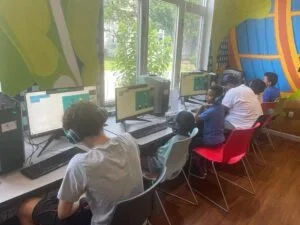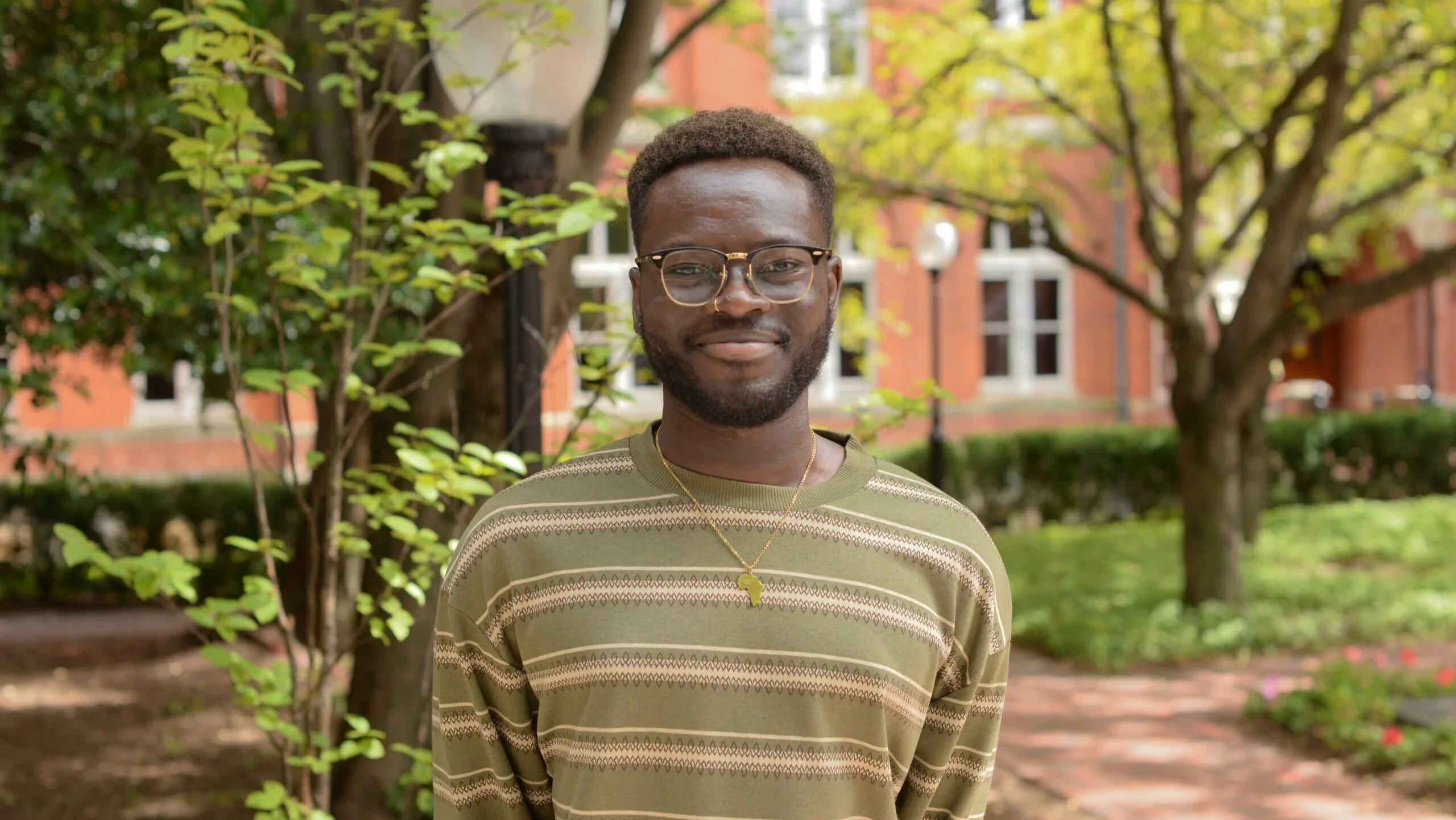Dismantling Systems of Oppression with Transformative Education: Kwabena Sekyere-Boateng (C’23) Wants to Start in the Computer Lab
This summer, Kwabena Sekyere-Boateng (C’23) completed a 10-week research fellowship with the MIT Institute of Data, Systems and Society. His research examined the complex ways in which technology can both reinforce and tear down systems of hierarchy and oppression.
Sekyere-Boateng’s work was fully funded through a Station1 Frontiers Fellowship, a selective program that empowers undergraduates in STEM to gain real-world research experience in socially-directed projects.
“Receiving the fellowship was exhilarating; it not only felt validating and affirming but also gave me a sense of belonging,” said Sekyere-Boateng, a computer science major and disability studies minor. “It underscored the reality that there’s a longstanding tradition of socially-directed science, and a vibrant community supporting it.”
Empowering Communities with Computers
Sekyere-Boateng conducted research alongside two other students, an undergraduate from George Mason University and a graduate student from MIT. The group’s objective was to investigate how transformative, technology-based educational experiences can empower marginalized communities. They relied on the Critical Participatory Action Research, or CPAR, a research framework suited for “documenting, challenging and transforming conditions of social injustice.”
“My research stemmed from interrogating how computer science as a discipline is often presented as neutral; however, it is a tool that perpetuates and reifies structural oppression,” said Sekyere-Boateng. “We focused on addressing this issue, particularly how computer science can also be used as a tool to combat structural oppression and empower marginalized communities.”
The group worked out of a computer lab at Camfield Estates, a federally funded voucher co-op in Boston, which has been described as “an oasis in a desert of affordable housing. The community has a long-standing collaboration with MIT.

Students working in the Camfield Estates computer lab.
“The initial phase involved developing a curriculum tailored for participants aged 10-15, which was both accessible and enriching, guided by liberatory computing principles,” explained Sekyere-Boateng. “Liberatory computing illuminates how computing curricula can empower African-American students with skills to address societal racism.”
In their curriculum, the researchers used MIT’s Scratch, a web-based coding community geared towards children, and Google’s CS First, a computer science curriculum for grade school students. The team integrated lessons into a larger project-based learning approach. To judge the efficacy of the curriculum, the research team relied on semi-structured interviews and surveys.
“While imparting programming fundamentals was essential, our primary objective was to instill in participants the understanding that their newfound skills could be leveraged for the betterment of their community,” said Sekyere-Boateng. “The central goal was to show students that they have the power to effect positive change using technology.”
This instruction, all conducted out of the Camfield Estates computer lab, was positively received by the students.
“During our data collection, we observed a notable shift in their perception,” said Sekyere-Boateng. “The students began to recognize that computers and programming could indeed be tools for good, and they felt equipped to harness these tools for community improvement.”
Sekyere-Boateng on the Hilltop
For Sekyere-Boateng, his own interest in technology started at a young age and ultimately set him on the path to Georgetown.
“My current interest in coding can probably be traced back to my days obsessed with online games like Club Penguin and Toontown,” said Sekyere-Boateng. “I was so obsessed that a friend and I set up a website dedicated to Club Penguin – it was a space for mission tutorials, coin hacks, and anything Club Penguin related.”
Engaging with coding in a fun, lighthearted atmosphere helped Sekyere-Boateng build skills at a young age that would empower him academically and socially for years to come. That kind of transformative experience is what Sekyere-Boateng wants to replicate for students everywhere.
At Georgetown, Sekyere-Boateng has been active both in the classroom and on campus. As an incoming first-year student, Sekyere-Boateng participated in Young Leaders in Education, Advocacy and Dialogue (YLEAD), a pre-orientation program for students interested in diversity and social justice.
“Being a part of YLEAD was transformative,” said Sekyere-Boateng. “It was my first community at Georgetown and we discussed structural oppression, our positionality and our role in the broader picture.”
Sekyere-Boateng has since worked as a YLEAD peer leader, a Sexual Assault Peer Educators (SAPE) Fellow and participated in the Leaders in Education, Advocacy and Dialogues (LEAD) program. He is also part of the African Society of Georgetown (ASG) and worked as course assistant in a class on introductory python. During his time on the Hilltop, Sekyere-Boateng co-founded The Cookout, a retreat for Black students at Georgetown, with peers from YLEAD.
For Sekyere-Boateng, his Station1 Fellowship felt like the culmination of an educational transformation that started when he first set foot on the Hilltop.
“What truly excited me was that it was the first space where my interests really intersected. Often, being the only, or one of the very few, Black students in a classroom can be isolating,” said Sekyere-Boateng. “However, this fellowship afforded me the opportunity to scrutinize computer science through the lenses I acquired from YLEAD and my other academic pursuits.”
After graduating this December, Sekyere-Boateng plans to continue pursuing justice through technology.
“I aspire to become a software engineer with a company that’s dedicated to coding for positive impact,” said Sekyere-Boateng. “Eventually, I would also like to delve deeper into research, building on the work I undertook during the summer. Ultimately, however, my goal is to become a professor, teaching computer science that is both holistic and intersectional.”
-by Hayden Frye (C’17)
